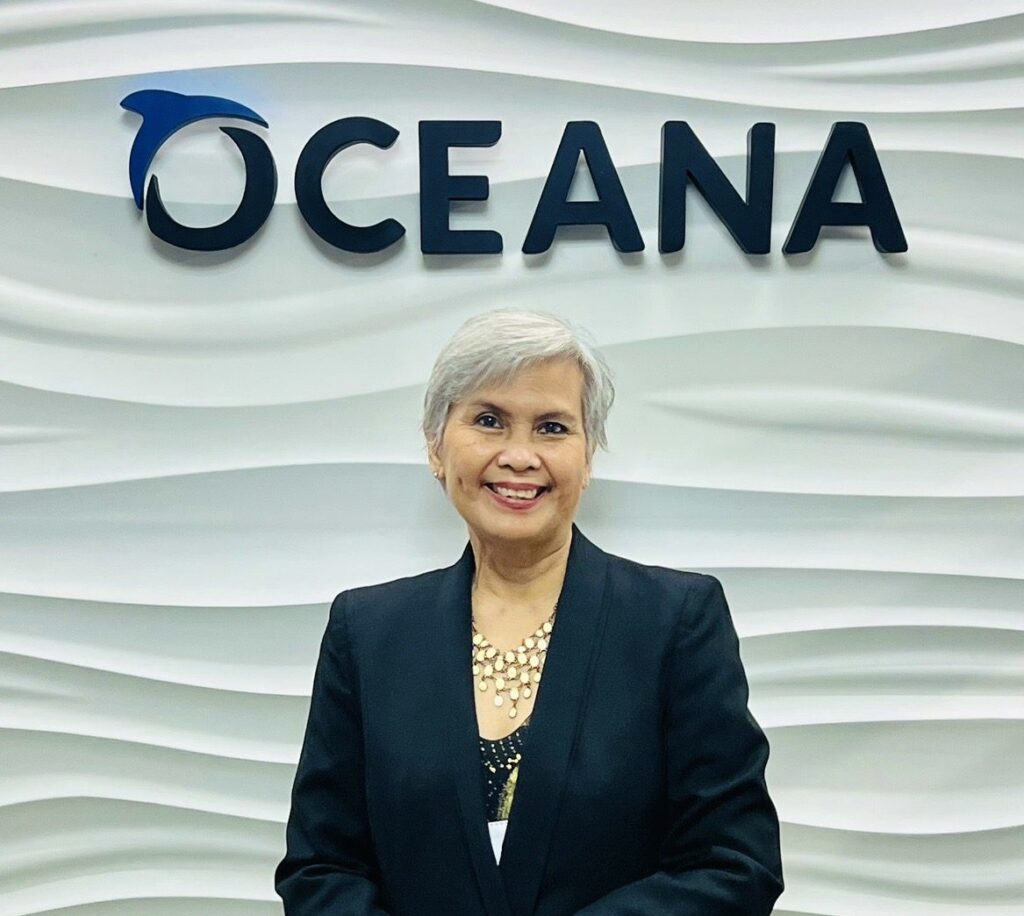June 12, 2024
Q&A with Gloria Estenzo Ramos, Oceana’s leader in the Philippines
BY: Sarah Holcomb

Gloria (“Golly”) Estenzo Ramos is Vice President of Oceana in the Philippines. Before joining Oceana, Ramos worked with Philippine Earth Justice Center to file environmental cases against projects that have harmed the country’s fisheries and marine ecosystems. Frequent visits to her father’s coastal hometown in Cebu throughout her childhood fostered Ramos’ deep appreciation for the ocean and its importance to the Philippines, which is home to some of the world’s richest marine biodiversity and largest fisheries.
2023 was a big year for Oceana in the Philippines. What accomplishments are you most proud of?
There are three! First, we’re proud that, despite strong lobbying from the industrial fishing industry, public tracking devices are now required on all commercial fishing vessels. The President of the Philippines also mandated that vessel monitoring requirements be fully implemented, which will help reduce illegal fishing in our waters.
Our second cause for celebration is sardines. The Fisheries Bureau instructed all regional offices across the Philippines to carry out a National Sardine Management Plan, which will help ensure this very important fishery stays healthy.
Finally, we worked with 25 local governments to establish coastal greenbelt areas, which will help protect mangrove forests. We are now campaigning for a national law to protect these vital ecosystems.Oceana’s leadership and partnership with artisanal fishers, academics, and local authorities was critical to accomplishing all three of these victories.
Illegal, unreported, and unregulated (IUU) fishing accounts for up to 40% of the fish caught in the Philippines. How does this affect local artisanal fishing communities?
Overfishing has caused an alarming decline in the seafood artisanal fishers rely on. When commercial fishing vessels illegally encroach in the coastal waters exclusively reserved for artisanal fishers, they decrease the amount of food and income available to those communities. Weak implementation of fisheries laws and regulations is a big reason why artisanal fishers face poverty in the Philippines. These fishers say that implementing tracking requirements for commercial vessels is their last hope.

How will the new victories help to hold illegal fishers accountable?
A fully implemented tracking system deters illegal commercial fishing. Merely turning off the tracking devices is now a criminal act. If the government holds commercial fishers accountable for illegal fishing, especially if it results in their licenses being revoked, there is great hope for our fisheries to rebound.
Thanks to campaigning by Oceana and its allies, the Philippines government is taking steps to rebuild sardine fisheries. Why are sardines especially important?
Many artisanal fishers depend on sardines for their livelihoods and sustenance. Sardines account for 15% of fish production in the Philippines. These small fish are packed with essential nutrients such as omega-3 fatty acids, vitamins, and minerals, which are important for young children and pregnant or nursing mothers, especially given the issue of malnutrition in our country.
What is the purpose of the National Sardines Management Plan?
Through the National Sardines Management Plan, the Philippines government is introducing new rules to ensure the sardine population stays healthy, like closing fishing during seasons when the sardines are breeding and putting limits on catching juvenile fish. The government is also taking steps to help fishers increase their income, such as improving cold storage to keep the fish fresh longer and strengthening connections between artisanal fishers and the markets for their catch. We’re working closely with artisanal fishers and both national and local athorities in the Philippines to ensure that this plan is properly implemented across the country.
Campaigning in the Philippines is important, but often risky work. What challenges do you and your team face?
When Oceana pushes for action and transparency about the true state of our fisheries, we are rocking the boat. Some are not so enthusiastic about our efforts. The Philippines is the most dangerous country in Asia for environmental defenders, including campaigners like ourselves, as well as lawyers, prosecutors, and judges. The security challenge is real, but Oceana has taken extra precautions to ensure our team remains safe as we campaign to save our oceans.
What changes are you campaigning for in 2024 and beyond?
We’re campaigning to protect Panaon Island, which is home to coral reefs that are still vibrant and thriving. These corals are far healthier than those in other parts of our waters, and we must prioritize their protection before irreparable damage is done. The bill to declare Panaon Island as a marine protected area is nearing the finish line. We’re just waiting for the Senate’s approval and the President’s signature — which we hope will take place very soon.
We’re also campaigning for a bill to establish a national coastal greenbelt zone to protect mangroves, which the Senate is currently considering. And we’re collecting baseline data for a potential new campaign focused on fishers’ livelihoods and nutrition — stay tuned.



